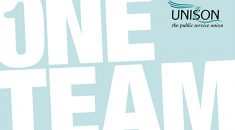“Hospital cleaning will become our main defence against potentially lethal infections such as MRSA, E. coli, Clostridium difficile (C. diff) and Norovirus, in a world without antibiotics” is the stark warning from Christina McAnea, UNISON head of health.
Effective antibiotics are likely to run out in the next 20 years, as infections become increasingly resistant to the drugs available.
In a survey of more than 2,000 health workers, 25% revealed that operations had been cancelled in their hospital in the past year due to outbreaks of infection. And 40% said that their hospitals had been forced to close wards because of infection.
Managerial concern over infection control has encouraged expensive cleaning systems, such as robots that use hydrogen peroxide and UVC. Companies that sell these are subjecting some hospitals to high pressure selling tactics, and wasting precious NHS resources, said the union.
Ms McAnea went on to say: “Hospitals are turning to these costly systems because they are desperate to find solutions to a world without antibiotics – a world we will all have to face in the next 20 years. These are expensive gimmicks that do not do the job as well as good old-fashioned soap, water and elbow grease.
“There is no room for complacency – people will be dying of untreatable infections in only a short time frame. But, instead of spending taxpayers’ money on expensive kit, that money would be better spent on increasing the hours spent cleaning. Cleaning staff should be given the training to tackle routine cleaning of high-risk near-touch sites besides the patient’s bed – the bedside locker, bed frame, buzzer, overbed table, etc. That is the way to cut down the spread of these potentially lethal infections.”
One well-known ‘superbug’ is MRSA. The union is highlighting flaws in the way that government is currently gathering statistics on the number of cases in hospitals, which masks a very real threat to patients.
Dr Stephanie Dancer, consultant microbiologist, said: “National figures show the number of MRSA infections as falling, but these are misleading because they only reflect the cases where MRSA has gained entry into a patient’s bloodstream. MRSA can still be acquired in hospitals on patient’s skin, in a wound, or cause chest and other infections. Some of these superficial infections require powerful and toxic antibiotic therapy as well as increasing the amount of time patients need to stay in hospital.
“Hand hygiene has been rigorously implemented in hospitals, but this only represents one way to control the spread of infections. Screening patients for MRSA has allowed more cases to be picked up prior to hospital admission. However, hospitals have to cope with accident and emergencies that don’t allow for early screening, so other measures need to be implemented. Targeted cleaning of hand-touch sites near the patient remains an inexpensive method for reducing the risk of MRSA and other hospital infections for patients.”
UNISON is calling for stricter accounting of MRSA cases amid fears that the number of patients picking up MRSA continues.


